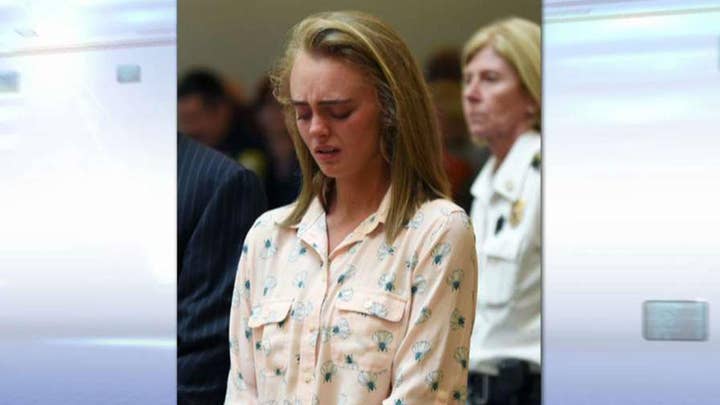
Massachusetts' highest court heard Michelle Carter's appeal of her 2017 conviction for involuntary manslaughter. As a teenager, she sent her boyfriend text messages urging him to kill himself, which he did in July 2014. (Family/Getty, File)
A woman convicted of involuntary manslaughter after she sent text messages encouraging her suicidal boyfriend to kill himself may have made bad choices but did not commit any crime, her lawyer argued before Massachusetts' highest court Thursday.
Attorney Daniel Marx said Michelle Carter, now 22, was a misguided teen who was struggling with her own issues and had been trying to help Conrad Roy III. He added that Roy had made "a tragic decision" to kill himself by filling his truck with carbon monoxide in a Fairhaven parking lot and was solely responsible for his own death.
"We can all see from the text messages that Michelle Carter did not force Conrad Roy to kill himself," Marx told the Supreme Judicial Court.
Carter was sentenced to 15 months in prison last year but has remained free while she pursues her appeal. The case has drawn international attention over the thorny legal questions and the insistent tone of her text messages to her boyfriend.
The court is expected to rule in the coming months.
The trial judge who convicted Carter focused on a message in which she told Roy to "get back in" after he climbed out of his truck as it was filling with the toxic gas and told her he was scared. The judge said Carter, then 17, had a duty to call the police or Roy's family when she knew he was killing himself.
YOUNG AMERICANS SAY ONLINE BULLYING A SERIOUS PROBLEM, POLL SHOWS
But the only evidence Carter instructed Roy to get back in the truck was a long, rambling text she sent to a friend two months later in which she called Roy's death her fault, Marx said. He also said there is no evidence Roy's life would have been saved had Carter called for help.
Prosecutors said Carter pushed Roy over the edge, noting he had tried to kill himself several times before and backed out. The day Roy died, Carter texted him: "You keep pushing it off and say you'll do it but u never do. It's always gonna be that way if u don't take action."
Assistant District Attorney Shosana Stern told the court that Carter knew she had "significant leverage" over Roy and became more insistent as he became more depressed. On the day of his death, Carter threatened that she was going to get him help if he didn't go through with his plan, Stern said.
FUNERAL DIRECTOR PLEADS GUILTY TO TAKING GRAPHIC PHOTOS OF BODIES
"She knew he was terrified of ending up in the hospital and disappointing his family," Stern said.
This is the second time Carter's case is before the state's high court. The court ruled in 2016 that Carter had to face trial, saying the grand jury was justified in indicting her with involuntary manslaughter.
When asked whether they would appeal the case to the U.S. Supreme Court if the justices don't rule in Carter's favor, Joseph Cataldo, another one of her attorneys, said they would consider all of their options.
The Associated Press contributed to this report.










































